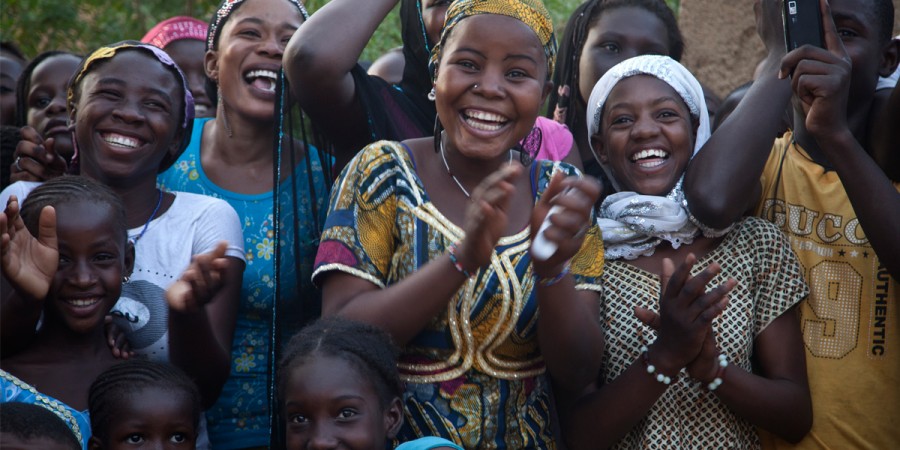During the Ebola outbreak in Sierra Leone and Liberia, I witnessed the power of young people as leaders – and life savers – as they worked around the clock to kick Ebola out of their country. These young humanitarians went door to door, sensitising people on the disease. They identified and reported potential Ebola cases and distributed food and non-food items to families in quarantine.
These young leaders provided psychosocial support to orphans and affected families, and they ensured children’s voices were heard, through radio, blogs, TV and film.
Local leaders are now starting to see young people in a different light and treating them with a new sense of respect; and rightly so.
So, as the world’s leaders, humanitarians and affected people prepare for the World Humanitarian Summit in Turkey in May 2016, are they ready to listen young humanitarians too – like those in West Africa?
Calling world leaders
The World Humanitarian Summit has a dedicated Youth Working Group for young people under 30, made up of organisations working with or for children and youth. The working group is responsible for a range of things, including youth policy and advocacy.
In September 2015, Qatar will host a dedicated Global Youth Consultation to develop a Global Youth Position which consolidates the views of today’s young humanitarians and the young people affected or concerned about humanitarian crises. As the organisers of the World Humanitarian Summit prepare, they must not underestimate the role of young people in both developing and taking responsibility for the identified solutions.
The next generation
The challenges our generation face are unprecedented. I recently came across a particularly shocking statistic: at the end of 2014, almost 60 million people had been forcibly displaced from their homes. That’s about seven times the population of London.
Today’s displaced young people have been severely affected by war and conflict, and they worry about the future, as they grow, learn and try to support their families. The situation is made worse by a lack of tolerance and empathy between sections of people around the world. Challenges young people face and learn about include the effects of the unregulated banks to big businesses, how corruption continues to show its ugly face through stories published in the media with the recent football scandal, and a sense that some of the international institutions are creaking. Even though some of these institutions have been set up with the best of intentions, they systematically fail to address the concerns and harvest the potential of young people.
To many young people’s eyes, some of the international institutions represent old powers clinging onto their self-interest. Since the global financial crisis, some countries and governments are perceived as looking inwards to serve their interests. And it might look like some of the new and emerging powers seem happy to turn to fighting and conflict, rather than bringing people together and taking on new leadership roles.
It doesn’t have to be like this. The young people of today can build the peaceful, equal and sustainable world of tomorrow that young people want. To reverse the existing situation, today’s generation wants and needs to understand each other, our similarities and differences, the causes of this mass displacement, and to develop a stronger responsibility towards each other and the resources we share. Young people need to be brave, and willing to challenge intolerance and lack of empathy through the political parties we elect and the businesses we work for and give our money to.
To that end, young people’s voices are imperative. From working with local leaders in Senegal, to Malala Yousafzai, who inspired young people and world leaders alike during the first-ever UN Youth Take-Over in New York, I have seen the impact passionate young women and men can have. Malala presented the Youth Resolution “The Education We Want” following consultations led by young people with their peers around the world. And time and again, young people refer to her as a role model and say they passionately share her vision. It is time to pay greater attention to these solutions and their strength of commitment.
Challenging circumstances
Through my work with child rights organisation Plan International, I have witnessed the impact of today’s humanitarian crises on young people – and I’ve seen their potential and determination when faced with the most challenging circumstances.
In South Sudan, I met colleagues who as children had been faced with two options. One: join, fight and kill others. Two: watch their own family get raped and killed. For young people in South Sudan today, death and murder remains inescapable. Those who have fled the current conflict are left without any employment or education opportunities to build their future. And still they find ways to stay strong in spirit and in looking for solutions.
After the Haiti earthquake in 2010, I saw the potential of young people as they rebuilt safer schools and child friendly spaces for children and young people to learn and play. They encouraged children and young people to come together through football, creating teams in the camps for displaced people, so they could overcome the horrors of the devastating earthquake.
I am constantly left humbled, shocked, overwhelmed and inspired by the strength, determination and passion shown by the young people I have met.
Hear their voices
As the World Humanitarian Summit draws nearer, leaders must continue to listen to young humanitarians and encourage them to make their voices heard! They must work with young people and together we can ensure that the priorities and proposals of young people are included, and that today’s young humanitarians are given the tools needed to have these solutions actually take place.
A peaceful, equal, sustainable and just future is possible. Today’s young people are ready. Are today’s leaders willing to listen and act together with us?


Comments